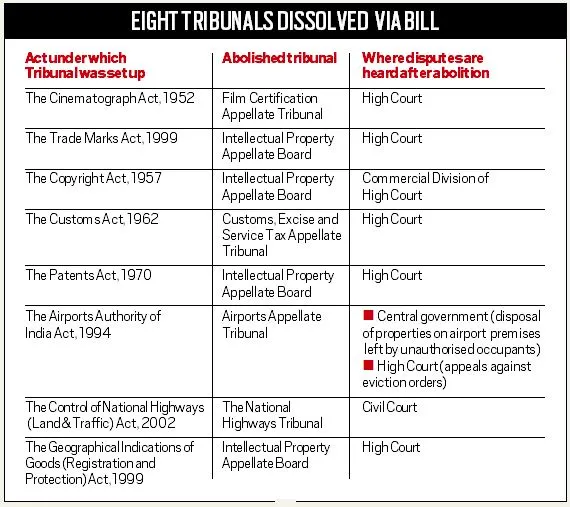Home / Current Affairs
Constitutional Law
Tribunal Reforms Act 2021 declared Void
«20-Nov-2025
Source: Supreme Court
Why in News?
The bench of Chief Justice of India BR Gavai and Justice K Vinod Chandran in the case of Madras Bar Association v. Union of India (2025) struck down the Tribunal Reforms Act, 2021, relating to appointments, tenure, and service conditions of tribunal members as unconstitutional.
What was the Background of Madras Bar Association v. Union of India (2025) Case?
- The petition was filed by the Madras Bar Association in 2021 challenging the Tribunal Reforms Act, 2021.
- In the 2020 Madras Bar Association case (MBA IV), the Supreme Court had struck down the Tribunal Rules 2020.
- In the 2021 Madras Bar Association case (MBA V), the Court struck down the Tribunal Reforms Ordinance 2021.
- In these earlier judgments, the Court had mandated that tribunal members should have at least 5-year tenure, and that lawyers having a minimum 10 years of experience must be considered for appointments.
- However, the 2021 Act prescribed only a 4-year tenure and imposed a minimum age limit of 50 years for appointments.
- The Act also prescribed that the search-cum-selection committee would recommend two persons for the post of Chairperson, deviating from earlier judgments.
- The Act fixed allowances and benefits to those of equivalent civil servants and imposed upper age caps of 70/67 years.
- The petitioner argued that the Act was contrary to previous Supreme Court judgments and violated principles of judicial independence.
- The Union Government filed an application seeking to refer the matter to a larger bench, which was rejected by the Court.
- The judgment was reserved on November 11, 2025, and pronounced on November 19, 2025.
What were the Court's Observations?
- The Court held that the provisions violate constitutional principles of separation of powers and judicial independence, which are firmly embedded in the Constitution.
- The judgment emphasized that Parliament cannot override judicial decisions by re-enacting the same measure in different form without addressing constitutional defects.
- The bench stated that the Act "merely reproduces, in slightly altered form, the very provisions earlier struck down" which amounts to legislative override.
- The Court rejected the Union's argument that a law cannot be tested on "abstract principles" such as judicial independence and separation of powers.
- The minimum age bar of fifty years, truncated four-year tenure with upper age caps, requirement to recommend two names for Chairperson, and fixing allowances to civil servant equivalents were all struck down as arbitrary.
- During hearings, CJI BR Gavai expressed displeasure at the Attorney General for seeking larger bench reference and adjournments, questioning if it was a "tactic" to delay the hearing till the CJI's retirement.
- The Court directed that until Parliament enacts a new Act, the directions given in MBA IV and MBA V cases will continue to operate.
- The Court directed the Union to form a National Tribunal Commission within four months.
- Appointments whose selection was completed before the Act commenced but whose formal notifications were issued afterward shall be protected and governed by parent statutes and MBA IV/V conditions.
What is the Tribunals Reforms Act, 2021?
About:
- The Act was enacted to streamline the functioning of tribunals by dissolving certain appellate tribunals and transferring their functions to existing judicial bodies like the High Courts.
- It was introduced in response to the Supreme Court's ruling in the case of Madras Bar Association vs. Union of India (2021), which struck down certain provisions of the Tribunal Reforms (Rationalisation and Conditions of Service) Ordinance, 2021.
Key Provisions:
- Abolition of Tribunal: The Act dissolves multiple appellate tribunals and shifts their functions to High Courts and other judicial bodies.
- Search-cum-Selection Committee: It has been established to recommend the appointment of tribunal chairpersons and members.
- For Central Tribunals:
- Chairperson: Chief Justice of India (CJI) or a Supreme Court judge nominated by the CJI (casting vote).
- Two Secretaries nominated by the Central Government.
- Sitting/outgoing Chairperson of the tribunal, or a retired Supreme Court judge, or a retired Chief Justice of a High Court.
- Non-voting member: Secretary of the relevant Union Ministry.
- For State Administrative Tribunals:
- Chairperson: Chief Justice of the respective High Court (casting vote).
- Chief Secretary of the State Government.
- Chairman of the State Public Service Commission.
- Sitting/outgoing Chairperson of the Tribunal or a retired High Court Judge.
- Tenure and Age Limits: Tenure for Chairperson and Members 4 years, with a minimum age of 50 years.
- The maximum age limit is 67 years for tribunal members and 70 years for chairpersons, or completion of the 4-year tenure, whichever is earlier.
- Tribunal Chairpersons and Members are eligible for reappointment, with preference given to their past service.
- Removal of Tribunal Members: Central government on the recommendation of the Search-cum-Selection Committee can remove Chairperson or a Member.
What are Tribunals?
A tribunal is a quasi-judicial institution that is set up to deal with problems such as resolving administrative or tax-related disputes. The original Constitution did not contain provisions with respect to tribunals. The 42nd Amendment Act of 1976 added a new Part XIV-A to the
- Part XIV-A is entitled as Tribunals and consists of two Articles namely Article 323A and 323B.
- Article 323-A: Deals with Administrative Tribunals for public service matters.
- Article 323-B: Provides for tribunals on various matters, including: Taxation, Foreign exchange, import and export, Industrial and labor disputes, Elections to Parliament and state legislatures, Food security.
Difference between Court and Tribunal
|
Court |
Tribunal |
|
|
|
|
|
|
|
|

